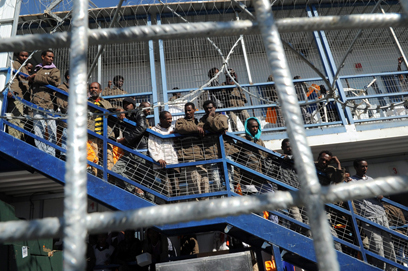
Eritrean migrants Gebre, 26, and Mebrahatom, 23, say there’s nothing they can do but wait in fear and continue to work illegally to support their families as the government plans to deport 60,000 illegal African migrants to an unidentified third country.
“In Israel, there is no peace for us,” said Gebre, who sends $200 a month to his six brothers and sisters in Eritrea. “Always trouble.”
Related stories:
- Op-ed: Migrants are not 'cancer'
- New law to allow indefinite detention of migrants
- Protest: South Tel Aviv conquered by refugees
According to court documents obtained last week, the Israeli government has reached an agreement with an unidentified country to deport 60,000 African migrants, the majority of which are Eritrean and Sudanese and have been crossing the Israeli-Egyptian border illegally over the past eight years.
For Benjamin, an illegal immigrant from Nigeria, the government’s plan feels like a painful step backwards.
“What can I do if they send me? Where would I start?” asked Benjamin, who also did not wish to disclose his last name.
“It’s like starting everything all over again. Learning a new language, finding a new job, getting used to a place,” said 18-year-old Evelyn Diaz from Colombia, who gained Israeli citizenship last year after spending 10 years as an illegal migrant in Tel Aviv.
The Israeli Army Radio reported last week that the unidentified country is located in East Africa and is not experiencing civil unrest, although the Israeli government has not yet confirmed the rumor despite orders by the Supreme Court last week.

Immigrants in Saharonim detention facility (Photo: Haim Hornstein)
State lawyer Yochi Gnesin said the deportation would occur gradually, but some migrants fear otherwise.
“They have to give them a chance to prepare themselves before they go back. Some people are not ready to go,” said Yonathan, an Eritrean national who did not want to disclose his last name for fear of police retaliation despite claims that he is living in Israel as a legal migrant.

Protest in south Tel Aviv. Green sign reads: 'Send the Sudanese back to Sudan.' (Photo: Motti Kimchi)
Reaction to the government’s plan has been mixed among Israelis living in Tel Aviv, a city with a large population of migrants, particularly in its southern neighborhoods.
“I wish there was a better solution,” said Eram, an industrial designer living in central Tel Aviv who did not wish to disclose his full name.
“On the one hand, we know that we survived the Holocaust and that we should help those who survived war zones,” he said.
“But Israel already has less budget to deal with our citizens that need help. It doesn’t have the tools to deal with illegal migrants,” he said.
Others were more decisive of the government’s plans.
“I disagree with it. They’re here, they went through trouble to get here. There’s not so many of them that they can’t absorb them,” said Bentzion Kal, a retail employee.
An estimated 2,000 illegal immigrants are currently being held in detainment for illegally crossing the border.
“If you don’t have enough space to hold all these refugees, why did you accept them?” asked Yonathan.
Police detective Avi believes the deportation scheme will lower crime rates in south Tel Aviv.
“I know that 80% of the crimes are committed by migrants,” he said, speaking of southern Tel Aviv. “They break into the apartments and cars,” said Avi, not wishing to disclose his full name because of work. “It’s very scary because the percent of crimes is going up,” he said.
The government is currently in talks with four other countries although their identities have also not been revealed.
- Receive Ynetnews updates
directly to your desktop















